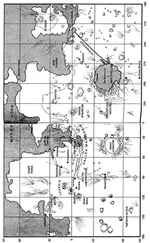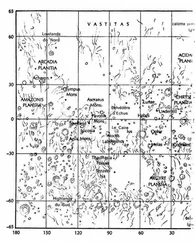The impact in the last half hour of the fall was so strong that everything far to north and south was flattened; people were saying that no one close enough actually to see the cable hit survived it, and most of the drone cameras had been smashed as well. For the final thousands of kilometers of the fall, there were no witnesses.
A late clip came in from the west side of Tharsis, from the second pass up that great slope. It was brief but powerful: a white blaze in the sky, and an explosion running up the west side of the volcano. Another shot, from a robot in West Sheffield, showed the cable blasting by just to the south; then an earthquake or sonic blast struck, and the whole rim district of Sheffield fell off the rim in a mass, dropping slowly to the caldera floor five kilometers below.
After that there were any number of video clips bouncing around the fragmented system, but they proved to be only repeats, or late arrivals, or film of the aftermath. And then the satellites began to shut down again.
It had been five hours since the fall began. The six travelers slumped in their chairs, watching or not watching the TV, too tired to feel anything, too tired to think.
“Well,” Sax said, “now we’ve got an equator just like the one I thought the Earth had when I was four years old. A big black line running right around the planet.”
Ann glared at Sax so bitterly that Nadia worried she would get up and hit him. But none of them moved. The images on the TV flickered, and the speakers hissed and crackled.
• • •
They saw the new equator line in person, the southern-most one anyway, on the second night of their flight toward Shalbatana Vallis. In the dark it was a broad straight black swath, leading them west. As they flew over it Nadia stared down somberly. It hadn’t been her project, but it was work, and work destroyed. A bridge brought down.
And that black line was also a grave. Not many people on the surface had been killed, except on the east side of Pavonis, but most if not all of those on the elevator must have been, and that in itself meant several thousand people. Most of whom had probably been all right until their part of the cable hit the atmosphere and burned up.
As they flew over the wreckage Sax intercepted a new video of the fall. Someone had already stitched up a chronological montage from all the images that had been sent onto the net live, or in the hours immediately afterward. In this montage, a very effective bit of work, the final clips were of the last section of the cable, exploding into the landscape. The impact zone was never anything but a moving white blob, like a flaw in the tape; no video was capable of registering such illumination. But as the montage continued the images had been slowed down and processed in every way possible, and one of these processed images was the final clip, an ultra-slow motion shot in which one could see details that would have been impossible to spot live. And so they could see that as the line had crossed the sky, the burning graphite had stripped away first, leaving an incandescent double helix of diamond, flowing majestically out of a sunset sky.
All a gravestone, of course, the people on it already dead at that point, burned away; but it was hard to think of them when the image was so utterly strange and beautiful, a vision of some kind of fantasy DNA, DNA from a macroworld made of pure light, plowing into our universe to germinate a barren planet. .
Nadia stopped watching the TV, moved into the copilot’s seat to help spot the other plane. All that long night she stared out the window, unable to sleep, unable to get the image of that diamond descent out of her mind’s eye. It was the longest night of their trip so far, for her. It seemed a kind of eternity before dawn came.
But time passed, another night of their lives, and at last dawn came. Soon after sunrise they landed at a pipeline service airstrip above Shalbatana, and stayed with a group of refugees who had been working on the pipeline, and were now caught there. This group had no political stance in common, and wanted only to survive until things got back to normal. Nadia found their attitude only partly refreshing, and tried to get them to go out and repair pipelines; but she did not think they were convinced.
• • •
That evening they took off once more, again laden with supplies given to them by their hosts. And the following dawn they landed on the abandoned airstrip of Carr Crater. Before eight, Nadia and Sax and Ann and Simon and Sasha and Yeli were out in walkers, and up to the crater rim.
The dome was gone. There had been a fire below. All the buildings were intact but scorched, and almost all their windows had been broken or melted. Plastic walls were bent or deformed; concrete was blackened. There were splashes of soot scattered everywhere, and piles of soot scattered here and there on the ground, little heaps of blackened carbon. Sometimes they looked like Hiroshima shadows. Yes, they were bodies. The outlines of people trying to claw down through the sidewalks. “The city’s air was hyperoxygenated,” Sax ventured. In such an atmosphere human skin and flesh were combustible and flammable. That was what had happened to those early Apollo astronauts, stuck in a test capsule filled with an atmosphere of pure oxygen; when the fire started they had burnt like paraffin.
And so here. Everyone on the streets had caught fire and rushed around like torches, one could see that by the placement of the soot piles.
The six old friends walked down together into the shadow of the eastern crater wall. Under a circular dark pink sky they stopped at the first clutch of blackened bodies, and then walked quickly on. They opened doors in buildings when it was possible, and knocked on all the jammed doors, and listened at the walls with a stethoscope device Sax had brought along. No sound but their own heartbeats, loud and fast at the backs of their coppery throats.
Nadia stumbled around, her breath harsh and ragged. She forced herself to look at the bodies she passed, trying to estimate heights from the black piles of carbon. Like Hiroshima, or Pompeii. People were taller now. They still burnt to the bone, though, and even the bones were thin black sticks.
When she came to a likely sized pile, she stood staring at it. After a while she approached, and found the right arm, and scraped with her four-fingered glove at the back of the charred wristbones, looking for the dotcode tag. She found it, cleaned it. Ran her laser over it like a grocery clerk pricing goods. Emily Hargrove.
She moved on, did it again with another likely-sized pile. Thabo Moeti. It was better than checking teeth against dental records; but she wouldn’t have done that.
She was light-headed and numb when she came to a soot pile near the city offices, alone, its right hand splayed out so that she only had to check. She cleaned the tag and checked. Arkady Nikelyovich Bogdanov.
They flew west for eleven more days, hiding through the daylight hours under stealth blankets, or taking shelter with people they encountered en route. During the nights they followed transponders, or the directions of the last group with which they had stayed. Though these groups often knew of each other’s existence and location, they were definitely not parts of a single resistance, or coordinated in any way. Some hoped to make it to the south polar cap like the prisoners from Korolyov, others had never heard of this refuge; some were Bogdanovists, others were revolutionaries following different leaders; some were religious communes or utopian experiments, or nationalist groups trying to contact their governments back home; and some were merely collections of survivors without a program, orphaned by the violence. The six travelers even stopped at Korolyov itself, but they did not attempt to enter when they saw the naked frozen bodies of guards outside the locks, some of them propped in standing positions like statues.
Читать дальше
Конец ознакомительного отрывка
Купить книгу












